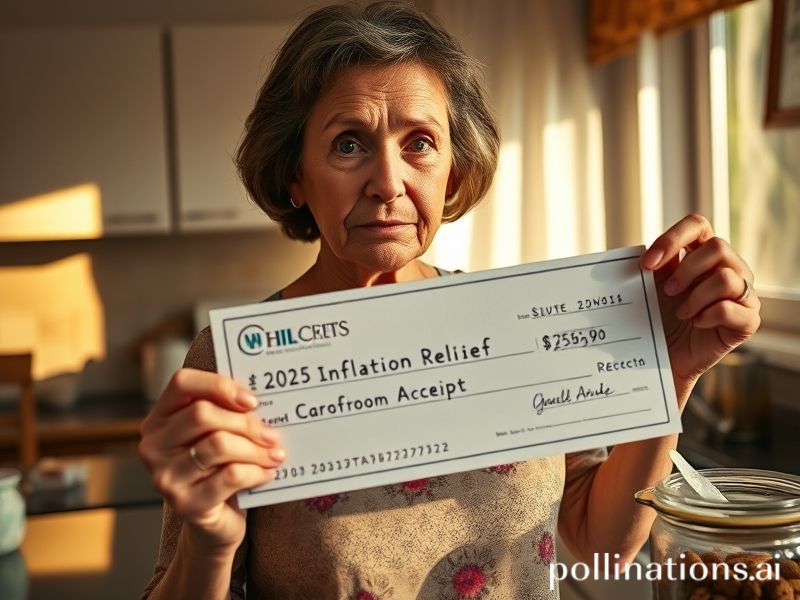Global Inflation Refund Checks: When Governments Pay You to Forgive Them for Robbing You
Inflation Refund Checks: The World’s Most Expensive Apology Note
By Our Man in Geneva, Still Waiting for His Own Check
GENEVA—The latest fad in crisis management is neither a rate hike nor a stern op-ed, but a literal envelope stuffed with what economists call “inflation refund checks,” and what the rest of us call “hush money with a memo line.” From California’s Golden State Stimulus III (subtitle: “We Spent the First Two on Consultants”) to Japan’s ¥50,000 “Energy Relief” coupons that can only be redeemed for seafood and quiet shame, governments have discovered the political beauty of sending citizens cash they themselves printed. It’s the geopolitical equivalent of apologizing for spilling red wine by handing you a half-empty bottle and saying, “Try the 2023 vintage—it pairs well with despair.”
Consider the global scoreboard. In the United States, some 23 million Californians are receiving checks up to $1,050, which analysts calculate will offset roughly 11 days of rent or three artisanal coffees in Palo Alto. Across the Atlantic, Italy’s €200 “bonus inflazione” arrives just in time to cover the increased price of a single Aperol spritz in Venice. Meanwhile, South Africa’s finance ministry—never one to miss a tragicomic beat—has announced a R350 “cost-of-living grant” that, at current exchange rates, can purchase a family-size bag of air and a polite shrug.
The mechanics are as elegantly absurd as a Swiss cuckoo clock made of debt. Central banks expand the money supply, prices rise, voters howl, and presto: a targeted transfer appears, financed by the same monetary expansion that caused the problem. It’s like prescribing cigarettes for a cough because, hey, at least the patient will look cool while wheezing.
International implications? Oh, they’re rich—like an oligarch’s offshore account. Emerging markets watch the spectacle with the weary envy of a commuter stuck in traffic eyeing a Lamborghini on fire. Ghana’s cedi has lost 45% of its value in a year, but its central bank can’t mail relief checks without triggering a currency collapse that would make the Weimar Republic look fiscally prudent. Instead, Accra’s government has opted for “moral suasion,” urging citizens to “eat less imported rice,” a policy as effective as asking a teenager to put down the phone because it’s family time.
China, ever allergic to direct cash transfers lest citizens get the wild idea that money can belong to people, is issuing digital coupons redeemable for domestic goods. The catch: they expire in three days, ensuring the velocity of money matches the velocity of panic. Analysts note the coupons are also geo-fenced, so a Shanghainese coupon can’t be spent in Shenzhen—because nothing says national solidarity like provincial border patrols for QR codes.
Europe, meanwhile, is pioneering the “targeted bribe.” Germany’s €300 energy allowance is means-tested against 2021 income, which is adorable in a continent where inflation has since turned every salary into a historical reenactment. France, never to be outdone, is sending €100 to anyone earning under €27,000, a threshold so precise it feels like Macron asked Siri, “How much does it take to stop a riot?” And in the UK, the Treasury is debating whether to brand its forthcoming payment as a “cost-of-living grant” or simply call it “Sorry About Boris.”
The broader significance is theological. After decades of preaching that markets are rational and inflation transitory, governments have resorted to the oldest human ritual: throwing coins at the angry mob and hoping the mob doesn’t notice the coins were minted from their own melted jewelry. The refund check is less economic policy than confessional booth—an admission that the grown-ups have no earthly clue what comes next, but here’s a bribe to keep quiet during the sermon.
And yet, cynicism aside, the checks do buy something priceless: time. Time for supply chains to unknot, time for energy markets to calm, time for voters to forget—just long enough for the next crisis to arrive gift-wrapped in its own envelope.
So when yours finally lands, dear reader, spend it quickly. The moment you hesitate, inflation will have already licked the stamp on the apology for the apology. In the great casino of modern economics, the house always wins, but occasionally it tips the croupier—in your own chips, naturally.







